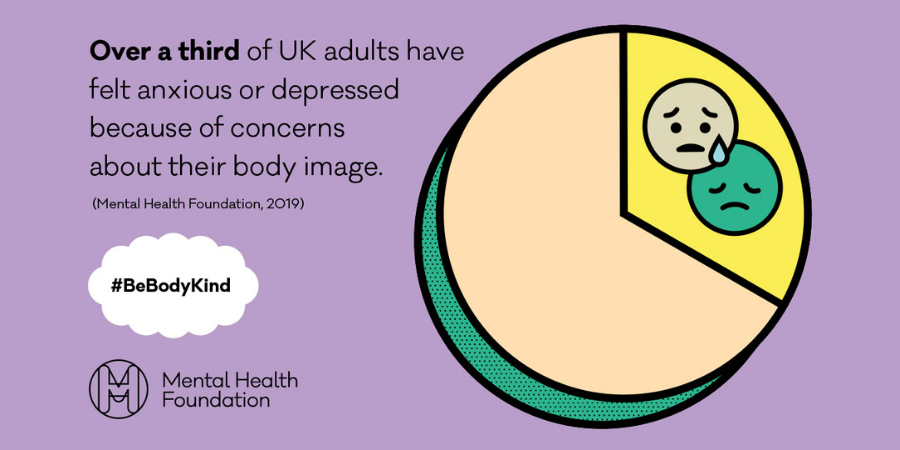13-19 May 2019 is Mental Health Awareness Week hosted by the Mental Health Foundation. This year's focus is on body image a subject that can affect all of us at any age.
‘Body image’ is a term that can be used to describe how we think and feel about our bodies. Our thoughts and feelings about our bodies can impact us throughout our lives, affecting, more generally, the way we feel about ourselves and our mental health and wellbeing.
How does body image affect mental health?
Having body image concerns is a relatively common experience and is not a mental health problem in and of itself; however, it can be a risk factor for mental health problems. Research has found that higher body dissatisfaction is associated with a poorer quality of life, psychological distress and the risk of unhealthy eating behaviours and eating disorders.
What causes body image concerns?
The way in which our experiences and environment affect our body image will be different for everyone. However, overall, the research suggests that body image can be influenced by:
- our relationships with our family and friends
- how our family and peers feel and speak about bodies and appearance
- exposure to images of idealised or unrealistic bodies through media or social media
- the pressure to look a certain way or to match an ‘ideal’ body type
There are further issues relevant to body image and mental health that are specific to certain factors and experiences, such as:
- long-term health conditions
- cultural differences around body ideals
- gender and sexuality
The above are often linked to other societal factors and discrimination.
New body image statistics
New online surveys were conducted by the Mental Health Foundation with YouGov in March 2019 of 4,505 UK adults 18+ and 1,118 GB teenagers (aged 13-19). The results highlighted that:
- One in five adults (20%) felt shame, just over one third (34%) felt down or low, and 19% felt disgusted because of their body image in the last year.
- Among teenagers, 37% felt upset, and 31% felt ashamed in relation to their body image.
- Just over one-third of adults said they had ever felt anxious (34%) or depressed (35%) because of their body image.
- One in eight (13%) adults experienced suicidal thoughts or feelings because of concerns about their body image.
- Just over one in five adults (21%) said images used in advertising had caused them to worry about their body image.
- Just over one in five adults (22%) and 40% of teenagers said images on social media caused them to worry about their body image.
What can we do?
Clearly, action is needed to build and promote positive body image and support good mental health and wellbeing in relation to our bodies. Everyone has a right to feel comfortable and confident in their own bodies and our report highlights key recommendations for:
- Effective regulation of how body image is portrayed.
- The need for commitment from social media companies to play a key role in promoting body kindness.
- Taking a public health approach to body image by training frontline health and education staff.
- Individually being more aware of how we can take care of ourselves and others in relation to body image.
Do you need urgent help?
If your mental or emotional state quickly gets worse, or you're worried about someone you know - help is available.
You're not alone; talk to someone you trust. Sharing a problem is often the first step to recovery.
#BeBodyKind









